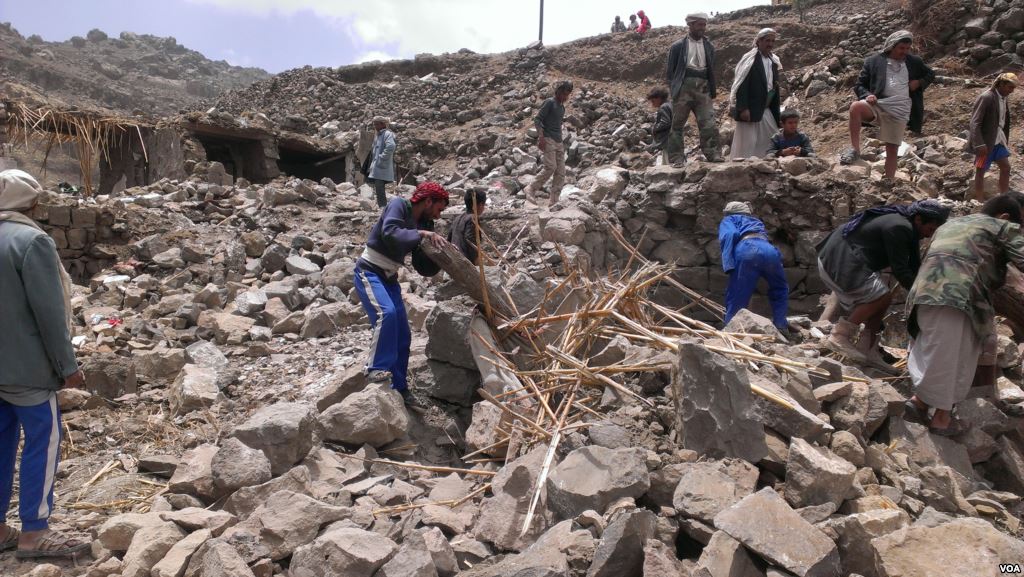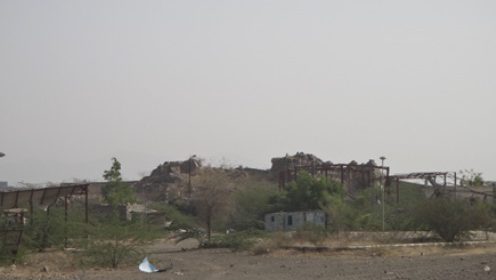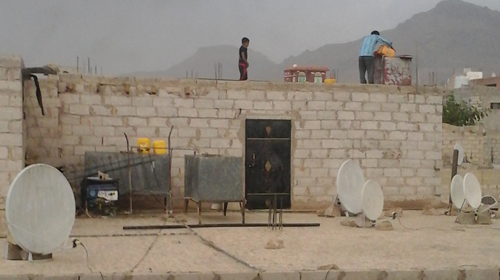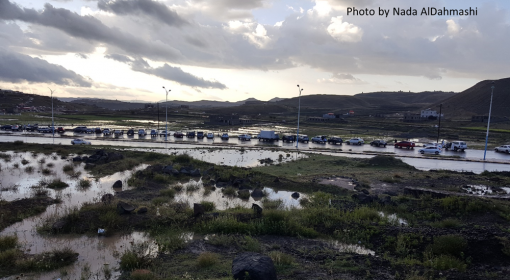by Frank van Steenbergen

Months after an airstrike on the village Hajar Aukaish in April, villagers scour rubble for belongings scattered during the bombing
(Image Courtesy: Wikipedia)
It is convenient to forget. It is our facility to deal with pain, injustice and our own worst mistakes. As a result there is half a world – and often the most bitter one – that seems to no longer exist. With that, all sorrow and concerns are gone.
The problem however is that people may live in this conveniently forgotten world. Take the 24 million people of Yemen. Since 2013 they are subject to a war waged upon them with no agenda. With all attention focused on Syria and Iraq, the real atrocities in Yemen, committed under leadership of Saudi Arabia, are forgotten.
A quick recap. When in 2011 the Arab Spring spread from one country to another, Yemen was not by-passed. Student protests gained much mileage, but they were quickly high-jacked by old political factions. In the ensuing protests, Yemen’s long term President Ali Abdulla Saleh resigned in October of that year, handing over power to the Vice-President, Hady. A National Dialogue started, modelled on South Africa’s Truth Commission, to heal wounds and redesign the country. Plans were made for a new federal Yemen. Just as all seems to be moving to a new phase, things soured. There was turmoil over the new constitution – especially from Yemen’s politically weaker South, but this was not the problem. All was surpassed when the Houthis – a tribal group with a strong social reform agenda from Saada Province in the far North – began to move out of their territory, joined with the ex-President, Ali Abdulla Salah, and captured large parts of capital Sana’a. The Houthi-Saleh partnership was a marriage made in hell, hard to understand. During the latter’s reign he fought no less than six wars against the Houtihis – some also to admittedly to play a divide and rule game with some his fiercest competitors for power rather than aiming at any territorial stake in Saada.
Enter Saudi Arabia (erstwhile close ally of Ali Abdulla Saleh) who under the pretext of protecting the new government started a prolonged bombing campaign. As months passed, this Saudi Arabian campaign – aided by Western allies – became more and more difficult to understand as both humanitarian and historical places were bombed with no rhyme nor reason. What was behind it? A Shia-Sunni divide? – but this never an issue in Yemen. The large oilfield discovered in Yemen on the border with Saudi Arabia? – more like it. Or did Saudi Arabia bomb just because it could and because no one blinked an eyelid (rather all looked the other way around in the ultimate effort of exercising forgetfulness, and restocking supplies).
Recently I got this letter passed on without comments through several foreign embassies (British and Dutch in this case). No comments, no indignity, just matter of fact – all tied in a conspiracy of silence and forgetting. These were also the countries that had big concerns on Yemen’s future – one of the world’s most water stressed countries with depleted aquifers. All that seems to be forgotten now. Just read the letter: Saudi Arabia assures every body of its highest regards for humanitarian and international aid organizations and announces it is going to bomb part of Yemen again. With courtesy…
Lets now also reflect a little on Saudi Arabia – the large elephant in the room, who ‘assure us of their highest respect’ in bombing a country that never asked for it; who are the driving force of the current mess in the Middle East; masterminding the Islamic State (what ever it may really be), following a long modern history of being the ultimate state sponsor of terrorism (read Sleeping with the Devil of Robert Bear).
Can we solve the Saudi Arabia problem? Here is a proposal to make a change: Make Saudi’s oil riches a global common property – strategically used under direction by a panel of enlightened people to drive energy prices in the right direction (balancing economics and the need to move out of fossils) and also with the proceedings going to a global development fund. This fund could be used to solve some of the most pressing problems around, such as the water scarcity in much of the Middle East and elsewhere in the world.
We would have the find a solution for the population of Saudi Arabia and wean them away from their life of wealth. By serving a greater purpose their spirituality and nearness to the centre of one of the world’s largest religions may be better served…
Let us also not just forget embarrassment and pain. Let us also not forget that we can make changes, that there can be another half– world that is better then the current state of affairs, that is not disturbed but compassionate and full of direction instead. Let us not forget to make the effort.



